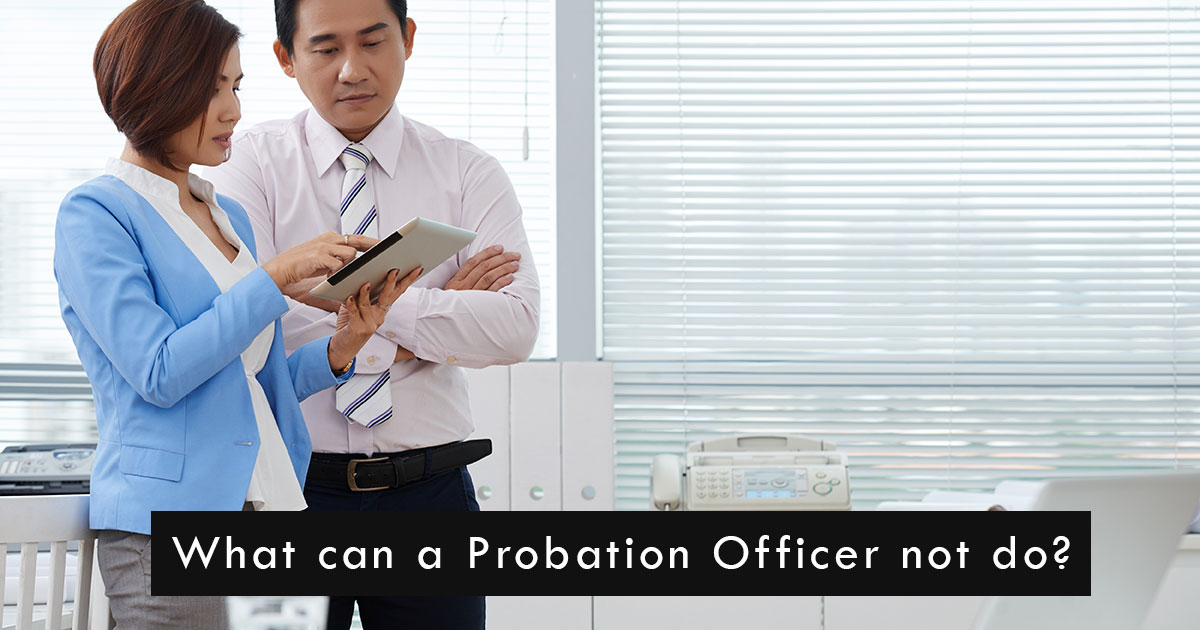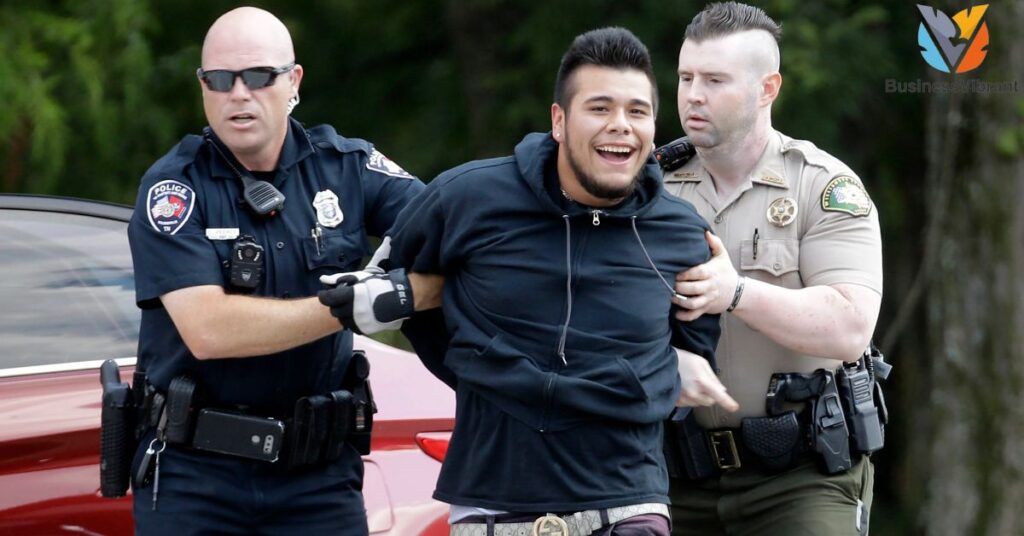A probation officer cannot violate an individual’s constitutional rights, discriminate or offer medical or legal advice. They also do not have the power to issue warrants or make arrests without the help of law enforcement.
Probation officers play a critical role in the criminal justice system by supervising and monitoring individuals who are on probation or parole. While they have a significant amount of power over probationers, there are also certain limitations to what they can and cannot do.
Understanding these limitations is crucial for probationers to protect their rights and ensure fair treatment. We will discuss what a probation officer cannot do, including topics such as personal relationships, law enforcement powers, and searches and seizures. By the end of this article, you will have a better understanding of the role of a probation officer and the limitations that come with it.
Role Of A Probation Officer
Probation officers play a crucial role in the criminal justice system, providing supervision and support to individuals on probation.
Key Responsibilities
- Monitoring Compliance: Supervising probationers to ensure they follow court-ordered conditions.
- Assessing Risks: Evaluating the risks and needs of individuals under supervision to determine appropriate interventions.
- Developing Plans: Creating rehabilitation plans tailored to each probationer’s circumstances.
Monitoring Compliance
Probation officers are responsible for ensuring that individuals on probation adhere to the conditions set by the court.
- Regular Check-ins: Conducting regular meetings with probationers to monitor their progress.
- Drug Testing: Administering drug tests to ensure compliance with substance abuse restrictions.
- Home Visits: Making visits to probationers’ homes to verify their living conditions and adherence to curfews.
Boundaries Of Authority
A probation officer, while entrusted with significant responsibilities, operates within well-defined boundaries of authority. Understanding the legal constraints and jurisdictional limits is crucial for probation officers to effectively carry out their duties.
Legal Constraints
Probation officers are subject to legal constraints that prohibit certain actions or behaviors. They are not authorized to make legal decisions or issue warrants, as these actions fall within the purview of the judicial system.
Jurisdictional Limits
Jurisdictional limits dictate the geographic area within which a probation officer has authority. They are typically responsible for individuals within a specific jurisdiction, and their actions and decisions are bound by the laws and regulations of that jurisdiction.
Interaction With Probationers
Probation officers have certain limitations to their job. They cannot have personal relationships with probationers, make arrests or conduct searches without a warrant, provide medical or legal advice, discriminate or violate constitutional rights. It’s important for probationers to understand the boundaries of their probation officer’s authority.
Probation officers play a crucial role in supervising individuals who have been placed on probation. It is important to understand the limitations and boundaries that probation officers must adhere to when interacting with probationers.
Privacy Considerations
Probation officers must respect the privacy of probationers and avoid discussing confidential information with unauthorized individuals. They are prohibited from disclosing personal details about probationers without their consent. This includes maintaining confidentiality during discussions and interactions with other parties involved in the probation process.
Respecting Rights
Probation officers must respect the constitutional rights of probationers, including their right to privacy and protection against unlawful searches and seizures. It is imperative that probation officers adhere to legal guidelines and protocols to ensure that probationers’ rights are upheld throughout the supervision process.
Search And Seizure Limitations
Probation officers are bound by specific limitations when it comes to search and seizure activities. These limitations are in place to protect the rights of individuals under probation.
Warrant Requirements
Probation officers are not permitted to conduct searches without a valid warrant. This means that they must obtain a warrant from a judge before they can proceed with a search. The warrant must outline the specific location to be searched and the items they are looking for, ensuring that the search is conducted within the confines of the law.
Scope Of Searches
The scope of searches conducted by probation officers is limited to the conditions outlined in the warrant. They are not allowed to exceed the boundaries specified in the warrant. Additionally, they must ensure that the search is directly related to the individual’s probation terms and conditions.
Arrest And Detainment Restrictions
As a part of arrest and detainment restrictions, a probation officer is prohibited from engaging in personal relationships with probationers, conducting searches or seizures without a warrant, giving medical or legal advice, violating constitutional rights, showing discrimination or bias, and using arrest and law enforcement powers.
Issuing Warrants
A probation officer is not authorized to issue warrants. If a violation of probation occurs, the officer must request a warrant from the court.
Imposing Detention
A probation officer does not have the power to impose detention. They do not have the authority to detain individuals. If detention is necessary, it must be ordered by the court.

Credit: kamanlaw.com
Personal Conduct And Relationships
A probation officer is expected to maintain a high standard of personal conduct and uphold professional relationships. There are specific boundaries and guidelines that must be adhered to in this regard.
Professional Boundaries
Probation officers must maintain professional boundaries with the individuals under their supervision. This includes refraining from engaging in personal relationships or any form of intimacy with probationers. Additionally, officers should avoid sharing personal information that is not relevant to the professional relationship.
Conflict Of Interest
Probation officers are prohibited from engaging in any activities that present a conflict of interest. This includes situations where the officer’s personal interests may interfere with their professional duties. Furthermore, officers should refrain from participating in activities or relationships that could compromise their ability to act impartially.
Discrimination And Bias
A probation officer plays a crucial role in supervising individuals who have been placed on probation, ensuring they adhere to the conditions set by the court. However, it is imperative for probation officers to understand the limitations and responsibilities that come with their role. Discrimination and bias are aspects that probation officers must be particularly mindful of in their interactions with probationers.
Upholding Equality
Probation officers are mandated to uphold equality in their treatment of all probationers. This includes providing fair and unbiased supervision regardless of a person’s race, ethnicity, gender, religion, or any other characteristic. It is essential for probation officers to maintain a non-discriminatory approach in their dealings with probationers to ensure that everyone is treated equitably under the law.
Avoiding Prejudice
Probation officers must actively avoid prejudice in their decision-making and interactions. They should refrain from making judgments based on stereotypes or preconceived notions about individuals under their supervision. It is crucial for probation officers to base their assessments and recommendations on the behavior and actions of the probationer, rather than on biased assumptions.
:max_bytes(150000):strip_icc()/probation-community-control-officer-974476-f6f17fd2465e44c7b138a151c376483f.png)
Credit: www.liveabout.com
Probation Officer Accountability
Probation officers are prohibited from engaging in personal relationships with those under their supervision, making arrests, or providing medical and legal advice. They cannot conduct searches without proper authorization and must uphold individuals’ constitutional rights.
Handling Complaints
Probation officers must address complaints promptly and professionally.
Supervisory Oversight
Supervisors ensure probation officers comply with regulations and ethical standards.
Rights Of The Probationers
Probation officers cannot conduct searches without a warrant, provide medical or legal advice, or have personal relationships with probationers. They are also prohibited from making arrests or violating constitutional rights. It is essential for probation officers to adhere to these limitations while fulfilling their duties.
Understanding Legal Protections
Probationers have certain rights that protect them during the probation process. It is important for individuals under probation to be aware of these legal safeguards.
Navigating The Probation System
Understanding the legal protections available to probationers is crucial for navigating the probation system effectively. By being informed about their rights, individuals can ensure fair treatment throughout the probation period.

Credit: businessvibrant.com
Common Misconceptions
A common misconception is that probation officers have the authority to arrest individuals or issue warrants; however, they must request these actions from the court. Additionally, probation officers cannot provide medical or legal advice, engage in personal relationships with offenders, or conduct searches without proper authorization.
Myths Debunked
Probation officers cannot make arrests or issue warrants.
They do not have law enforcement powers.
Probation officers cannot provide medical or legal advice.
Clarifying Probation Rules
Probation officers monitor compliance with court-ordered conditions.
They supervise probationers to ensure adherence to rules.
Officers refer individuals to necessary programs and services.
Frequently Asked Questions
What Not To Say To A Probation Officer?
Avoid lying, being disrespectful, refusing to cooperate, discussing illegal activities, and missing appointments.
What Are The Conditions Of Probation In Texas?
Probation conditions in Texas include following laws, avoiding illegal substances, and staying away from negative influences.
What Can A Probation Officer Do In Texas?
In Texas, a probation officer can set up appointments, answer questions, refer to classes, and supervise individuals.
What Is The Most Difficult Part About Being A Probation Officer?
The most difficult part about being a probation officer is managing large caseloads and maintaining schedule flexibility.
Conclusion
A probation officer cannot violate laws, conduct illegal searches, or provide medical advice. They also cannot maintain personal relationships with offenders or enforce arrest powers. Understanding these limitations is crucial for both probation officers and individuals under supervision.


